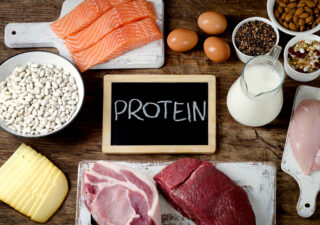
Optimal Sleep & Weight Loss Clinic
WOODBRIDGE, VA OFFICE
13000 Harbor Center Drive
Suite #212
Woodbridge, VA 22192
703-955-5355
FALLS CHURCH, VA OFFICE
7777 Leesburg Pike
Suite #312
Falls Church, VA 22043
703-955-5355

More Weight Control, Nutrition & Exercise Articles
The Importance of a High Protein Diet for Weight Loss

Obesity is a chronic disease that affects more than a third of adults in the United States. Many weight loss programs and diets recommend increasing protein intake, but why is protein so important, and how much do we actually need?
What Are the Benefits of a High-Protein Diet?
A high-protein diet can support weight loss in several key ways:
1. Reduced Appetite
Protein takes longer to digest than other macronutrients, helping you feel full for longer and potentially leading to reduced calorie consumption. A higher protein intake increases satiety hormones like GLP-1, peptide YY, and cholecystokinin, while lowering hunger hormones like ghrelin. One study showed that when overweight men consumed 25% of their daily calories from protein, their cravings decreased by 60%. For those interested in putting these findings into practice as part of a balanced approach to eating, it can be useful to visit BerryStreet website for additional nutrition insights and structured guidance.
2. Boosted Metabolism
Protein helps regulate your metabolism by supporting enzymes and hormones that are critical for energy production. When you consume more protein, you increase the efficiency of your metabolism, which means your body burns more calories throughout the day.
3. Burn More Calories
Protein has a higher thermic effect compared to other macronutrients. This means your body expends more energy to process protein. While not all sources agree on the exact numbers, it’s clear that protein has a thermic effect of 20-30%, compared to carbohydrates (5-10%) and fat (0-3%). For example, when you eat 100 calories from protein, your body burns 20-30% of those calories just processing the protein.
4. Muscle Building
Protein plays a key role in muscle growth and repair, helping you maintain muscle mass while losing weight. Muscle tissue accounts for around 25% of your resting metabolic rate. Combining protein intake with resistance training can help prevent muscle loss, which is a common issue for people who lose weight. Maintaining muscle mass keeps your metabolism high and lowers the chances of regaining weight.
How Much Protein Is Optimal?
The recommended daily intake of protein is 46 grams for adult women and 56 grams for adult men, which is sufficient to prevent deficiency. However, individuals aiming to lose weight may require more.
Many experts recommend that protein should make up 30% of your daily caloric intake for weight loss. Alternatively, you can calculate your protein needs based on body weight, aiming for 0.7 to 1 gram of protein per pound of lean body mass (or 1.5 to 2.2 grams per kilogram). Athletes and individuals with specific fitness goals may need higher protein levels.
Is a High-Protein Diet Right for Me?
A high-protein diet may not be suitable for everyone. For instance, individuals with chronic kidney disease should be cautious, as a high-protein diet could worsen kidney function. Always consult with your healthcare provider before starting a high-protein diet.
Other Articles You May Find of Interest...
- Are Bananas Acidic or Alkaline? Discover the Truth About Their pH Levels
- Revitalize Your Health with a Simple 3-Day Gut Cleanse at Home
- Essential Dietary Tips: What Foods Should You Avoid While Taking Sucralfate?
- The Dangers of Starvation and Healthier Alternatives
- Unlocking the Secrets: Effective Ways to Use MCT Oil for Weight Loss
- Is Green Tea Caffeine Drinks the Refreshing Boost You Need?
- How Semaglutide Helps Regulate Appetite and Support Weight Loss














